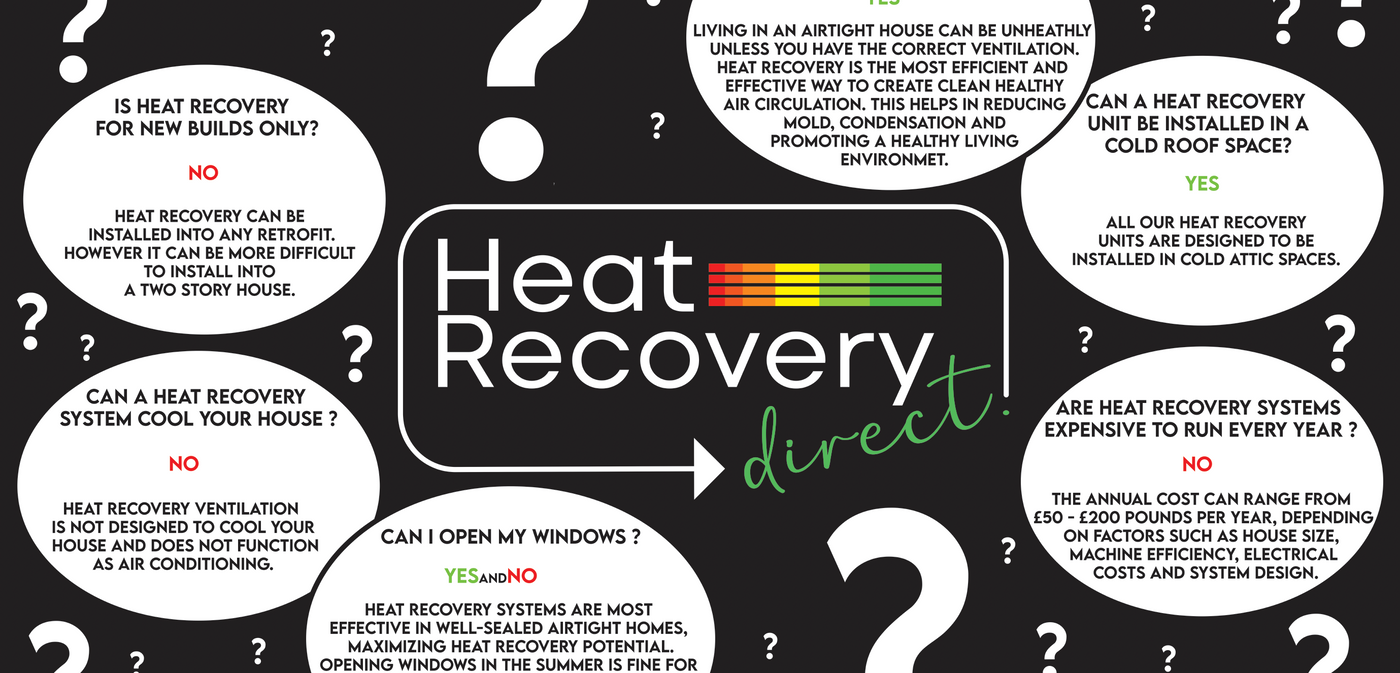Frequently Asked Questions
Can Heat Recovery Heat My House?
Can Heat Recovery Heat My House?
❌ No - Heat recovery systems are not designed to generate heat independently.
They extract passive heat from within your home and transfer it to the fresh air coming in, this efficient process helps reduce your heating bill by makin the most of your existing warmth in your living space.
Is There A Supply And Extract In the Same Room?
Is There A Supply And Extract In the Same Room?
❌ No - Kitchens / Wet Rooms have Extracts. Living Spaces / Bedrooms have supplies
MVHR Systems – Frequently Asked Questions
What does MVHR stand for?
What does MVHR stand for?
MVHR stands for Mechanical Ventilation with Heat Recovery. It's a whole-house system that provides continuous ventilation
while recovering heat from the extracted air.
How does an MVHR system work?
How does an MVHR system work?
It extracts warm, stale air from rooms like
kitchens and bathrooms, recovers the heat through a heat exchanger, and
supplies fresh, filtered air to living areas without mixing the two airflows.
Will an MVHR system heat my home?
Will an MVHR system heat my home?
No. An MVHR system doesn't generate heat, but it recovers and reuses existing heat to reduce heating demand.
How much heat does it recover?
How much heat does it recover?
High-quality MVHR systems recover between 60% and 95% of the heat from outgoing air, depending on system efficiency and airtightness of the home.
Is a MVHR system noisy?
Is a MVHR system noisy?
Not if properly installed. Good MVHR units
with insulated ductwork operate quietly, especially when designed with radial
systems.
Can I still open my windows?
Can I still open my windows?
Yes, but it's not necessary for
ventilation. Opening windows may reduce the system’s efficiency.
What maintenance does it require?
What maintenance does it require?
Minimal. Filters should be replaced or
cleaned every 3–6 months, and the system checked every two years.
How much electricity does a heat recovery system does it use?
How much electricity does a heat recovery system does it use?
Typically
20–80 watts, costing around £50–£80 per year to run
CanI retrofit MVHR in an existing home?
CanI retrofit MVHR in an existing home?
Yes, but it can be more complex than in new builds. Careful planning for ducting and layout is essential. Heat Recovery Direct are here to help ! we can design and guide you through the install process.
Is MVHR suitable for all types of homes?
Is MVHR suitable for all types of homes?
It's ideal for airtight homes, especially
new builds, Passivhaus, and low-energy properties. It can also be a great addition to a retrofit or even an old stone building.
Do MVHR ducts need insulation?
Do MVHR ducts need insulation?
Yes. Especially ducts that run through
unheated spaces to prevent heat loss and condensation.
Can I install MVHR myself?
Can I install MVHR myself?
You can use DIY kits, but professional
commissioning is recommended to ensure compliance and performance.
What happens during a power cut?
What happens during a power cut?
The system stops temporarily and restarts
automatically when power returns. There’s no lasting damage.
Does MVHR prevent condensation and mould?
Does MVHR prevent condensation and mould?
Yes. It removes excess moisture and keeps
humidity levels balanced, helping prevent mould and damp.
Can MVHR help cool the house in summer?
Can MVHR help cool the house in summer?
Not like AC, but it helps by bringing in
cooler night air with the summer bypass feature.
Can it distribute heat from towel rails or stoves?
Can it distribute heat from towel rails or stoves?
It can redistribute warm air, but it
is not a replacement for a heating system.
What are common MVHR installation mistakes?
What are common MVHR installation mistakes?
Poor duct design, unbalanced airflow,
flexible ducting overuse, lack of commissioning, and missing insulation.
Does A MVHR system run all year?
Does A MVHR system run all year?
Yes. MVHR systems are designed to run 24/7, year-round. Many have a summer bypass feature for warmer months.
















































